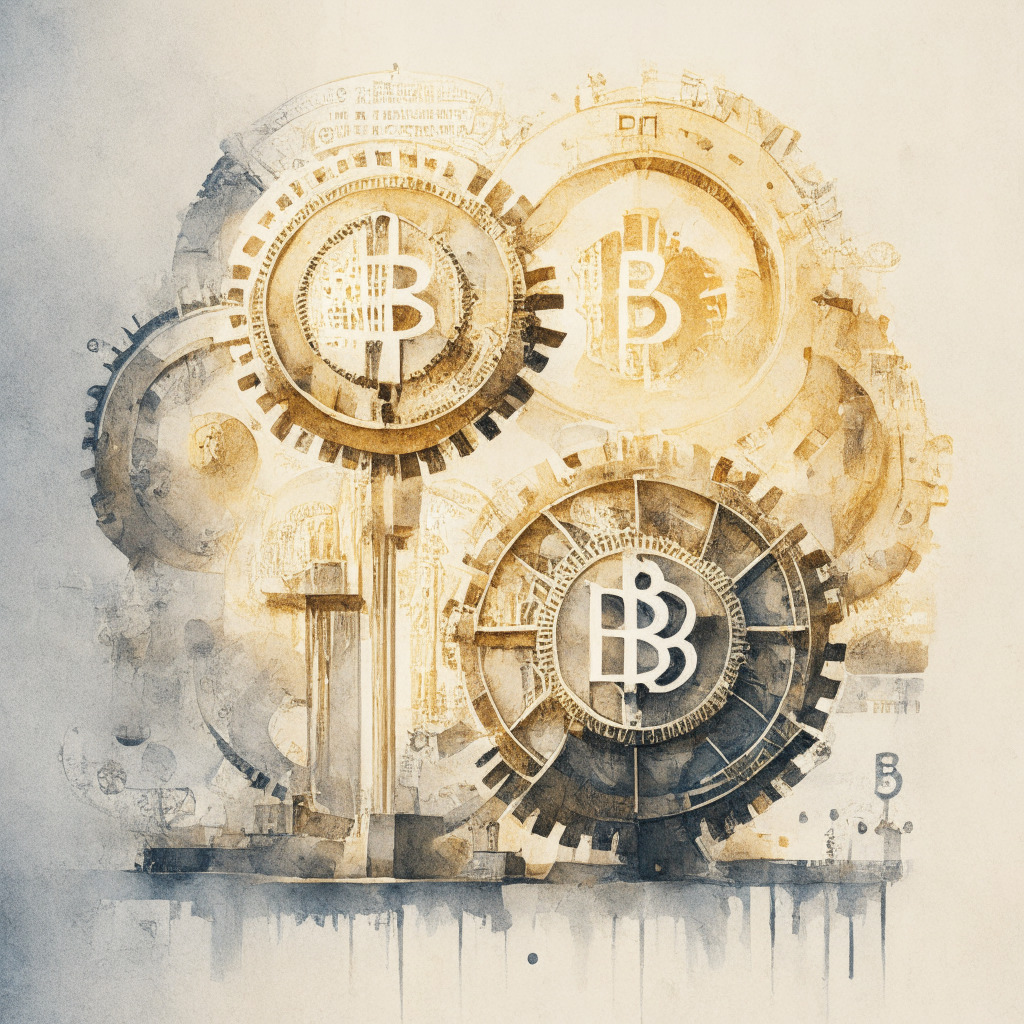“Federal Reserve Banks express concern that stablecoins could introduce instability into the financial system due to lack of standard regulatory framework. The Central Bank of Italy reinforces stablecoins’ unstability and presses for international regulatory body to govern cryptocurrencies. Despite risks, blockchain-based cross-border payments show promise of cost-effective solutions.”
Search Results for: New York Federal Reserve
Federal Reserve Impacts on Bullish BTC and Ethereum’s Centralization Struggles
Arthur Hayes, former CEO and co-founder of Bitmex, anticipates a response to the BTC bull market within six to twelve months. This expectation is connected to the Federal Reserve’s $25 billion program meant to stabilize the U.S. banking system. Meanwhile, Ethereum faces challenges around the centralization of nodes and scalability.
Federal Reserve Rate Hikes: Impact on BTC Price and Investor Preferences for Ethereum
US Fed officials consider more rate hikes despite debt ceiling crisis, potentially impacting BTC price. St. Louis President James Bullard suggests raising interest rates twice this year, while Minneapolis Fed President Neel Kashkari believes in raising rates over 6% to curb inflation. Smart money seems more inclined to invest in Ethereum over Bitcoin, indicating a possible shift in investor preferences.
Exploring CBDCs for Seamless Cross-Border Transactions: Potential and Challenges
The New York Federal Reserve and Monetary Authority of Singapore’s joint research suggests that Central Bank Digital Currencies (CBDC) operating on different networks could enable cross-border and cross-currency payments with near real-time settlement finality. This development highlights the potential for a transformative shift in global finance.
Revolut’s License Woes & ASX Ditches Blockchain: Debating Innovation vs Stability
The Bank of England may reject Revolut’s banking license due to balance sheet concerns, while ASX Ltd opts for a conventional technology for its software overhaul instead of blockchain. HashKey Group plans to raise funds at a $1 billion valuation, and Grayscale exploits a potential loophole with a new Bitcoin ETF filing. Ledger’s controversial service launch is deemed a PR failure, and Bit Digital moves operations to Iceland for regulatory risk mitigation. Researchers suggest CBDC systems can be used for cross-border payments, and Switzerland’s canton of Zug raises the limit for tax payments in BTC and ETH.
Crypto Markets and the Looming US Recession: Surviving the Economic Storm
The potential for a US recession looms over crypto markets, impacting cash flow and real-world utility. Crypto’s survival will depend on the recession’s root cause, duration, and severity. Tokens with real-world impact are likely to be more resilient. Focus on profit margins and cash flow remains critical for startups and investors.
Unraveling Stablecoins: Booming Assets or Impending Crisis?
“This report by the United States Federal Reserve Banks reveals the potential impact of stablecoins on the economy. Highlighting the similarity between stablecoins and money market funds, it warns of the vulnerabilities these coins face during market downturns. Issues like risky backing collateral and erosion of investor confidence can lead to substantial losses.”
Bitcoin’s Puzzling Standstill: A Precursor to Bull Run or Bear Crawl?
The crypto market shows a moderate increment with Bitcoin nearing the $30,000 mark, and Ethereum remaining stagnant. The forthcoming U.S July Consumer Price Index could serve as a catalyst, but concerns exist regarding potential bearish trends and the need for regulatory reforms. Recent developments include PayPal’s Ethereum-based stablecoin, an AI chatbot, and restoration of stolen funds.
Coinbase Q2 Earnings: Bullish Analysts Defy FactSet’s Predicted Decline Amid Regulatory Challenges
Despite FactSet consensus projecting a decrease in Coinbase’s revenues, analysts anticipate a robust Q2 report, influenced by active retail trading and the U.S. District Court decision regarding XRP tokens and bitcoin ETF demand. However, factors such as potential court ruling reversal, regulatory concerns and Coinbase’s ongoing SEC lawsuit may affect the outlook.
The Maze Unravels: DOJ Digs into Celsius and Mashinsky’s Alleged Misdeeds
“Alex Mashinsky, founder of crypto lending platform, Celsius, faces accusations of securities fraud, wire fraud, and conspiracy to influence the price of CEL, Celsius’ token. DOJ’s request for extra time to comb through Celsius’ records and communications could potentially reshape the regulatory landscape of the crypto industry.”
Could Bitcoin Decide the Next President? Exploring Cryptocurrency’s Growing Political Influence
“Bitcoin and the crypto community could be deciding factors in a U.S. presidential election. Candidates now need to proclaim their stance on cryptocurrencies. The U.S. Federal Reserve estimates that 8%-11% of the American population, owning cryptocurrencies, can considerably influence the election. Anti-Bitcoin policies may thus, alienate a rapidly growing cohort of voters.”
Prospects and Pitfalls of a Regulated Liability Network in Revolutionizing Wholesale Payments
Financial giants Citigroup, HSBC, and BNY Mellon are experimenting with a “regulated liability network” for negotiating wholesale payments via shared ledgers, which may revolutionize the handling of payments. However, questions regarding security, implications for CBDCs and private stablecoins, and the potential for increased digital bureaucracy persist. This suggests a need for careful investigation and a balanced perspective on the potential risks.
FTX Founder’s Criminal Trial Progress: A Battle Between Crypto Innovation and Regulation
FTX founder Sam Bankman-Fried’s trial faces multiple criminal charges, including wire fraud and bank fraud, highlighting the ongoing debate surrounding cryptocurrency regulations. The case emphasizes the struggle between emerging digital assets and traditional financial regulations, potentially shaping the landscape of cryptocurrency regulations and the digital asset market.
Bitcoin and Ether Rally Amid Equities Decline: What Lies Ahead for Crypto and Stocks
Cryptocurrencies experienced a rally with Bitcoin and Ether rising 5% and 3% respectively, while equities faced losses. Investors are anticipating signs of interest rate changes from the Federal Reserve. The upward trend in Bitcoin’s price and increased institutional interest signal a potential shift in sentiment towards cryptocurrency’s longevity, although caution is advised due to market volatility.
US Banking Crisis: Crypto Downturn & Big Returns for Risk-Takers, Weighing Pros & Cons
The recent US regional banking crisis highlights the disparity between major Wall Street banks and smaller institutions, affecting US banking stocks. Investor Michael Burry purchased shares in beleaguered banks, and amidst market uncertainty, the crypto market experiences a downturn.
Exploring CBDCs for Wholesale Cross-Border Payments: Project Cedar x Ubin+ Insights
The Federal Reserve Bank of New York’s NYIC and the Monetary Authority of Singapore’s Project Cedar x Ubin+ explored utilizing central bank digital currency (CBDC) for wholesale cross-border payments, focusing on interoperability and efficiency. Their findings showcase potential gains but also highlight concerns and challenges, including privacy, security, and financial system impact.
Fed Chair Powell’s Speech Impact: Inflation, Rate Hikes, and Bitcoin Market Volatility
Federal Reserve Chairman Jerome Powell participates in the Perspectives on Monetary Policy panel on May 19, with Fed officials leaning towards raising interest rates to control inflation. Market participants, including the cryptocurrency community, closely watch the developments, especially Bitcoin prices, as the market remains volatile and uncertain.
Crypto Market Unfazed by Debt Ceiling, Stablecoins Diversify, and SEC’s Ripple Case Unveils Secrets
As the U.S. debt ceiling discussions continue, stablecoin issuers like Tether and Circle diversify their reserves amid dollar risks. Meanwhile, a federal judge ruled the SEC cannot seal documents related to ex-official William Hinman’s 2018 crypto speech, potentially revealing the reasoning behind ether not being considered a security.
Stablecoin Regulation: Balancing Innovation and Consumer Protection in the US Market
California Rep. Maxine Waters has introduced a draft bill to regulate stablecoins in the United States, focusing on payment stablecoin issuers’ requirements, digital dollar research, and related subjects. Supporters say a clear regulatory framework would ensure oversight and consumer protection, while critics argue it could hinder innovation and limit the broader adoption of cryptocurrencies.
Crypto Bank Runs: The Role of Whales and Risky Investments in Market Turmoil
A recent study found that the 2022 crypto bank runs were majorly triggered by whale account holders withdrawing large portions of their funds. Crypto platforms’ run risks arose from allowing unrestricted withdrawals while using funds for risky, illiquid investments, highlighting policy concerns.
Michael Burry’s Strategic Moves in Distressed US Banks and Crypto: Opportunities or Risks?
Michael Burry, the “Big Short” investor, strategically acquires shares in distressed banks, boosting confidence in banking stocks. Despite crises and valuation slumps, Burry’s investments tackle different avenues within the banking ecosystem, while also exploring the digital currency space. Market research is crucial for investment decisions.
Blockchain Revolution: Navigating the Pros, Cons, and Main Conflicts in the Crypto Industry
The blockchain and cryptocurrency revolution offers a future of potential and uncertainty, with supporters praising their transparency and security, and skeptics questioning their reliability and long-term sustainability. As the crypto landscape rapidly evolves, understanding the pros and cons, engaging in open discussions, and staying informed is crucial for safe adoption.
Banking on the Edge: How Crypto-Friendly Policies and Regulatory Easing Led to a Series of High-Profile Bank Failures
The recent series of high-profile bank failures in the United States has sparked intense debate […]






















